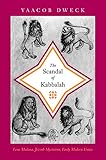The scandal of Kabbalah : Leon Modena, Jewish mysticism, early modern Venice / Yaacob Dweck.
Material type: TextSeries: Jews, Christians, and Muslims from the ancient to the modern worldPublication details: Princeton, N.J. ; Oxford : Princeton University Press, ©2011.Description: 1 online resource (280 pages) : illustrationsContent type:
TextSeries: Jews, Christians, and Muslims from the ancient to the modern worldPublication details: Princeton, N.J. ; Oxford : Princeton University Press, ©2011.Description: 1 online resource (280 pages) : illustrationsContent type: - 9781400840007
- 1400840007
- 9781283114998
- 1283114992
- 296.1/6 23
- BM526 .D84 2011eb
- online - EBSCO
| Item type | Current library | Call number | URL | Status | Notes | Barcode | |
|---|---|---|---|---|---|---|---|
 eBook
eBook
|
Biblioteca "Angelicum" Pont. Univ. S.Tommaso d'Aquino Nuvola online | online - EBSCO (Browse shelf(Opens below)) | Online access | Not for loan (Accesso limitato) | Accesso per gli utenti autorizzati / Access for authorized users | (ebsco)368290 |
Browsing Biblioteca "Angelicum" Pont. Univ. S.Tommaso d'Aquino shelves, Shelving location: Nuvola online Close shelf browser (Hides shelf browser)
Includes bibliographical references (pages 239-272) and index.
Introduction -- 1. Hebrew manuscripts in an age of print -- 2. Early modern criticism of the Zohar -- 3. Guiding the perplexed -- 4. Safed in Venice -- 5. A Jewish response to Christian Kabbalah -- 6. The afterlife of Ari Nohem -- 7. Kabbalah and scholarship in the nineteenth century -- Epilogue.
Print version record.
The Scandal of Kabbalah is the first book about the origins of a culture war that began in early modern Europe and continues to this day: the debate between kabbalists and their critics on the nature of Judaism and the meaning of religious tradition. From its medieval beginnings as an esoteric form of Jewish mysticism, Kabbalah spread throughout the early modern world and became a central feature of Jewish life. Scholars have long studied the revolutionary impact of Kabbalah, but, as Yaacob Dweck argues, they have misunderstood the character and timing of opposition to it.









